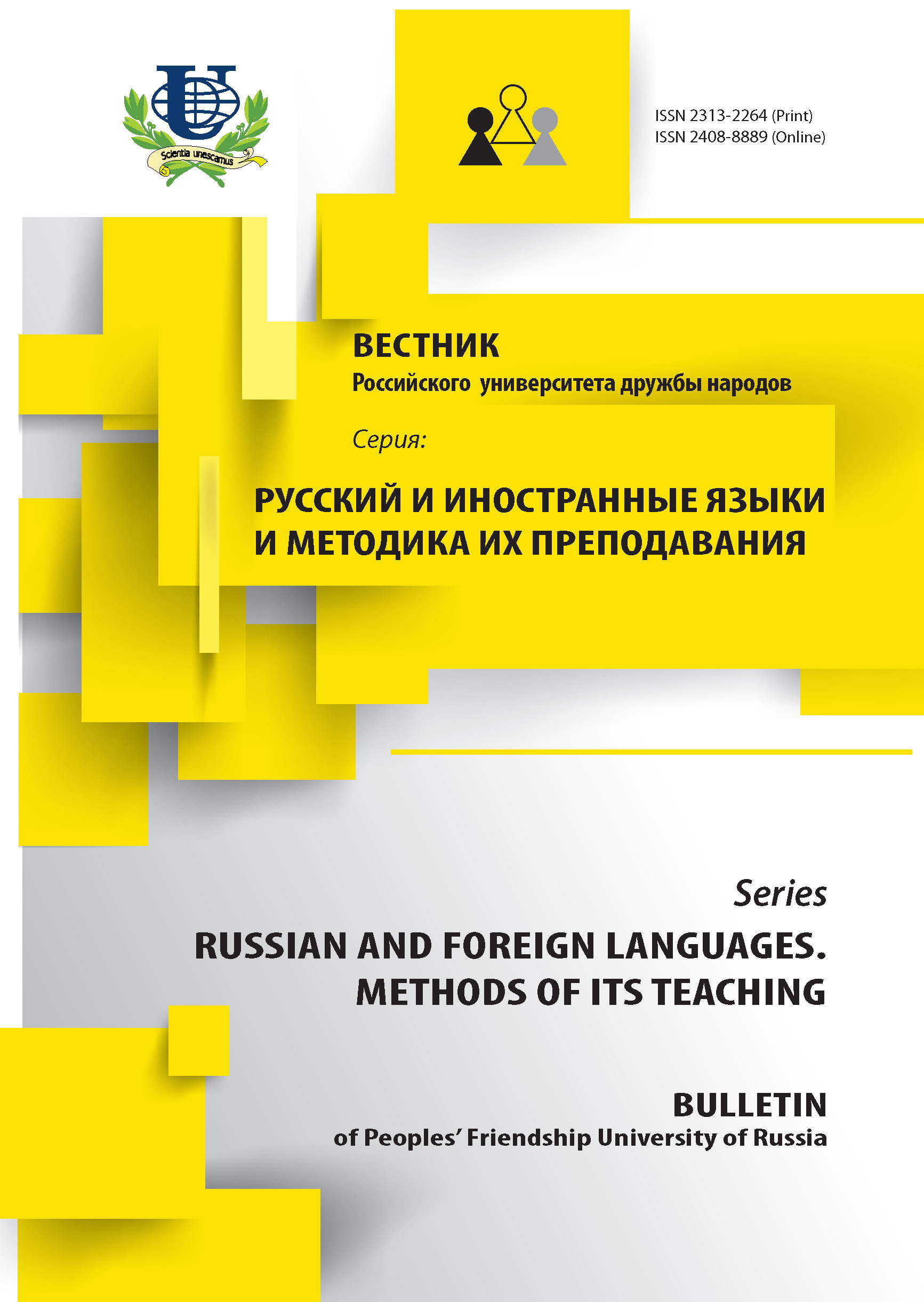No 3 (2013)
- Year: 2013
- Articles: 18
- URL: https://journals.rudn.ru/russian-language-studies/issue/view/616
Articles
Language personality’s verbal component structure: the system of basic contexturologemes
Abstract
The article studies the specifics of verbal component structure of the synthetic language personality in countercultural linguistic epoch of Russian rock. Special attention is paid to a certain type of new conceptual codes — the system of basic contexturologemes.
Russian Language Studies. 2013;(3):5-10
 5-10
5-10


Conceptualization of dispensation in russian language worldview
Abstract
The article characterizes the peculiarities of conceptualization of dispensation represented in a Russian 16 th-century book “Domostroj”. The aim of the research is to construct and describe lexical and semantic field of traditional dispensation conceptual sphere in Russian language worldview.
Russian Language Studies. 2013;(3):11-14
 11-14
11-14


 15-20
15-20


 21-26
21-26


Morphological alternation in teaching russian as a foreign language
Abstract
The article deals with linguistic and methodological aspects of teaching Russian morphology when taking into account morphological alternations in inflection. Alternation is characterized in terms of speaker’s grammar. Speech-oriented alternation minimum is proposed.
Russian Language Studies. 2013;(3):27-32
 27-32
27-32


Shift verbs at the lessons of russian as a foreign language
Abstract
The article analyzes methods of work with the verbs expressing the idea of subject’s and object’s shift in a space. The classifying table is given, and the various training exercises are described. Phraseological units on the topic are recommended as an additional material.
Russian Language Studies. 2013;(3):33-38
 33-38
33-38


Work on lexical combinability based on political texts in foreign audience
Abstract
The article is devoted to the problem of teaching foreign students compatibility of sociopolitical lexis. The essence of the concept of «compatibility», the types of compatibility, the specifics of Russian phrases in sociopolitical speech style, difficulties in teaching foreigners, ways of preventing possible mistakes, methodological approaches to the use of phrases of socio-political speech style are analyzed in the article.
Russian Language Studies. 2013;(3):39-43
 39-43
39-43


 44-47
44-47


The author’s involvement/non-involvement category in stylistic analysis of english biographical texts (on the material of english biographies)
Abstract
The article is dedicated to the methodology of stylistic analysis based on the category of the author’s involvement/non-involvement on the material of English biographical texts. This category is connected to the linguistic expression of the author’s intention in biographical prose. The main theses are illustrated with examples from P. Ackroyd, A. MacDonald, R. Jenkins.
Russian Language Studies. 2013;(3):48-56
 48-56
48-56


 57-62
57-62


 63-68
63-68


 69-73
69-73


Method of phonetic associations as integral part of teaching foreign language
Abstract
This article analyzes method of phonetic associations used at English lessons in primary school. The author analyzes psychophysical abilities of human memory, variants of Atkinson method, the technology of its application. Qualitative and quantitative results of the experiment on application the method in 2—5 forms of secondary school No. 5 of Nadym are given.
Russian Language Studies. 2013;(3):74-82
 74-82
74-82


 83-89
83-89


Theoretical bases of the course «Practice of oral communication in Chinese»
Abstract
The article examines the main approaches to creating modern foreign language courses. The authors analyze different approaches to teaching Chinese in Russia and abroad. The presented results were obtained when implementing an educational project of the Higher School of Economics “Speak Up”. Taking into account the results, the authors selected the methodological approach that suits the purpose of the course best of all. These approaches were effectively combined in the course “Practice of Oral Communication in Chinese”, mainly aimed at developing students' communicative competence.
Russian Language Studies. 2013;(3):90-100
 90-100
90-100


Control in modern linguodidactics
Abstract
The article deals with the conceptual basis to provide optimal control of the content of training materials, improve their quality and efficiency. On the example of the tests to the educational complex “Hello, Russian!” the authors demonstrate possible solutions of some methodological and didactic problems. The article may be useful for specialists interested in teaching Russian as a Foreign Language.
Russian Language Studies. 2013;(3):101-107
 101-107
101-107


 108-113
108-113


Our authors
Russian Language Studies. 2013;(3):114-116
 114-116
114-116















